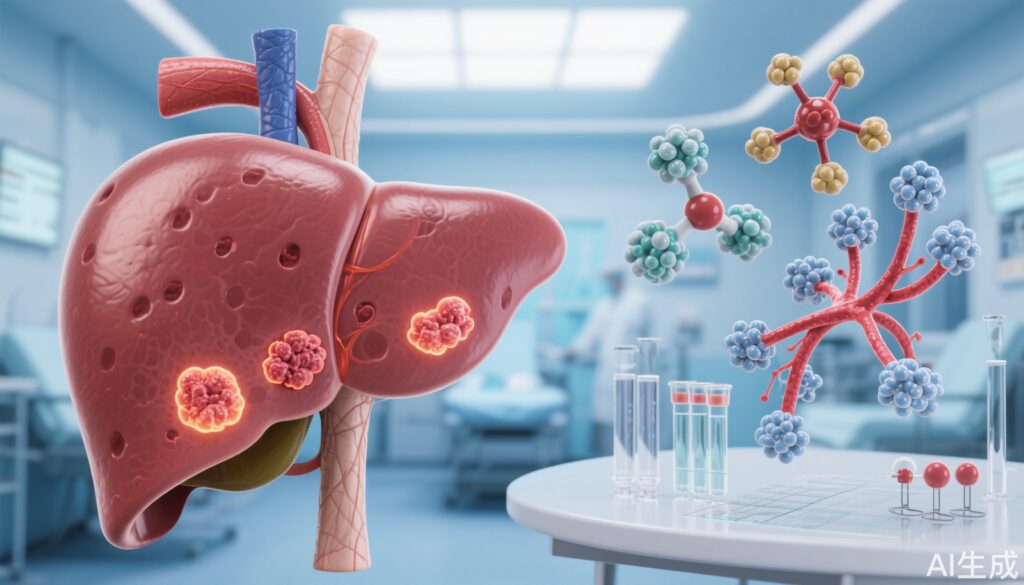Highlights
- Toripalimab plus bevacizumab significantly improved progression-free and overall survival compared to sorafenib in advanced hepatocellular carcinoma (HCC).
- The combination regimen was associated with a manageable safety profile, with grade 3-4 adverse events comparable to sorafenib.
- This regimen is now approved in China, expanding first-line options for advanced HCC.
Study Background and Disease Burden
Hepatocellular carcinoma (HCC) represents a major global health challenge, ranking as the sixth most common cancer and the fourth leading cause of cancer-related mortality worldwide. The high incidence and mortality of HCC are particularly evident in East Asia, where hepatitis B and C prevalence remains high. Despite the introduction of immune checkpoint inhibitors and antiangiogenic therapies, a significant unmet need persists in the first-line treatment of advanced HCC, driven by limited accessibility, cost, insurance coverage, and regional regulatory approvals. Sorafenib, a multikinase inhibitor, has been the standard of care for more than a decade, but its survival benefit is modest. The integration of PD-1/PD-L1 inhibitors with antiangiogenic agents has shown promise, prompting the need for robust comparative efficacy and safety data in diverse patient populations.
Study Design
The HEPATORCH trial (ClinicalTrials.gov: NCT04723004) was a randomized, open-label, phase 3 study conducted across 57 hospitals in mainland China, Taiwan, and Singapore. Eligible patients were aged 18-75 years with previously untreated, unresectable or metastatic HCC, and an ECOG performance status of 0 or 1. Participants were randomized 1:1 to receive either toripalimab (240 mg IV every 3 weeks) plus bevacizumab (15 mg/kg IV every 3 weeks) or sorafenib (400 mg orally twice daily). Stratification factors included presence of macrovascular invasion or extrahepatic spread, ECOG status, and history of locoregional therapy. Co-primary endpoints were progression-free survival (PFS), evaluated per RECIST v1.1 by independent review, and overall survival (OS). Safety was assessed in all treated patients.
Key Findings
A total of 326 patients were randomized (162 to toripalimab plus bevacizumab; 164 to sorafenib). The median age was 58 years in the combination group and 56 years in the sorafenib group; 87% of patients were male.
At a median follow-up of 9.4 months for PFS, the toripalimab plus bevacizumab group demonstrated a statistically significant improvement in progression-free survival:
- Median PFS: 5.8 months (95% CI 4.6–7.2) for toripalimab plus bevacizumab vs 4.0 months (2.8–4.2) for sorafenib
- Hazard ratio (HR): 0.69 (95% CI 0.53–0.91), p=0.0086
For overall survival, with a median follow-up of 16.4 months, the results also favored the combination arm:
- Median OS: 20.0 months (95% CI 15.3–23.4) for toripalimab plus bevacizumab vs 14.5 months (11.4–18.8) for sorafenib
- HR: 0.76 (95% CI 0.58–0.99), p=0.039
Objective response rates and disease control rates (not specified here) further supported the superior efficacy of the combination regimen.
Safety analysis revealed grade 3 or higher adverse events in 63% of patients in the combination group and 61% in the sorafenib group. The most frequent grade 3-4 adverse events with toripalimab plus bevacizumab included hypertension (16%), thrombocytopenia (10%), upper gastrointestinal hemorrhage (6%), anemia (6%), and abnormal hepatic function (6%). Serious adverse events of note included upper gastrointestinal hemorrhage (7% vs 1% in sorafenib), but the incidence of fatal treatment-related adverse events was low and similar between arms (1% each).
Treatment discontinuation due to adverse events occurred in 13% (toripalimab + bevacizumab) vs 12% (sorafenib). These findings indicate that the combination regimen, while associated with expected vascular and hematologic toxicities, remains manageable within experienced centers.
Expert Commentary
The HEPATORCH trial’s results align with the positive trajectory seen in other immunotherapy plus antiangiogenic combinations, such as atezolizumab plus bevacizumab in the IMbrave150 study. The benefit in both PFS and OS with toripalimab plus bevacizumab confirms the role of dual pathway inhibition in HCC and is especially relevant for regions where access to global checkpoint inhibitor regimens may be constrained by regulatory or economic factors.
Clinical adoption of this regimen, now approved by the National Medical Products Administration in China, offers a vital new option for a population with limited alternatives. However, clinicians should remain vigilant for bleeding risk, particularly in patients with portal hypertension or esophageal varices—a known complication highlighted by the increased incidence of upper gastrointestinal hemorrhage in the combination arm.
It is worth noting that the trial population was predominantly hepatitis B positive, reflecting the epidemiology of HCC in East Asia, which may limit generalizability to Western populations where hepatitis C or non-viral etiologies predominate. Further studies in broader populations and real-world settings will help refine the optimal use of this regimen.
Conclusion
The HEPATORCH phase 3 trial establishes toripalimab plus bevacizumab as a new first-line standard for advanced HCC in China, demonstrating meaningful improvements in both progression-free and overall survival over sorafenib, with a tolerable safety profile. These findings expand the therapeutic landscape for HCC and underscore the importance of making novel immune-oncology and antiangiogenic therapies accessible to patients worldwide. Ongoing research should address long-term outcomes, biomarker-driven patient selection, and strategies for optimizing safety in routine practice.
References
Shi Y, Han G, Zhou J, Shi X, Jia W, Cheng Y, Jin Y, Hua X, Wen T, Wu J, Gu S, Bai Y, Wang X, Zhang T, Chen Z, Zhang B, Huang M, Liu H, Mao Y, Zhou L, Wang R, Shan Y, Zhang W, Song T, Guo Y, Zhou F, Shao B, Zhang M, Liang B, Zheng J, Zhang G, Shen J, Su W, Zhang F, He Y, Hu S, Liu R, Zhang C, Shen S, Zeng H, Wang TE, Guo W, Shen Y, Chen Y, Li Y, Samol J, Hu H, Zhang W, Du C, Li E, Liu C, Pin CS, Li X, Xu H, Huang JF, Hao C, Lv J, Wang W, Xu Q, Bai A, Zhang X, Liu B, Jin C, Fan J. Toripalimab plus bevacizumab versus sorafenib as first-line treatment for advanced hepatocellular carcinoma (HEPATORCH): a randomised, open-label, phase 3 trial. Lancet Gastroenterol Hepatol. 2025 Jul;10(7):658-670. doi: 10.1016/S2468-1253(25)00059-7. Epub 2025 May 20. PMID: 40409323.
Cheng AL, Qin S, Ikeda M, et al. IMbrave150: Atezolizumab plus bevacizumab versus sorafenib in unresectable hepatocellular carcinoma. N Engl J Med. 2020;382(20):1894-1905.



